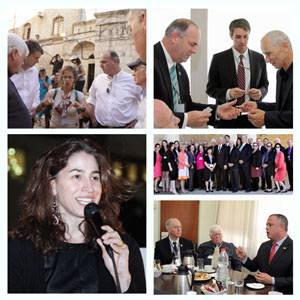- About Us
- Policy Center
- Learn
- Press Room
- Blog
- Get Involved
- Donate
- Donate to J Street Online
- Make a Gift in Someone’s Honor or Memory
- Make a Monthly Gift
- Tax-Deductible Donations
- Giving by mail
After traveling to the region with five members of Congress and American Jewish leaders, J Street Board Vice Chair Alexandra Stanton sent this update.
Last weekend, I returned from Israel as part of J Street’s latest congressional delegation after five intense, exhausting but truly rewarding days.
I was one of 15 J Street leaders who joined five members of Congress for meetings with Israeli, Palestinian and American officials, experts and activists. We met with Israeli lawmakers from five political parties including Zionist Union co-leader Tzipi Livni and Joint List leader Ayman Udeh who spoke movingly that “the fight for equality is a fight for the future of my country.”
 |
| See more photos on Facebook |
We visited Sderot on the Gaza border and a nearby moshav, the Palestinian and Israeli areas of Hebron, the West Bank settlement-city of Efrat, the new Palestinian city of Rawabi and the bilingual Hand-in-Hand School, which was the victim of an arson attack by Jewish extremists in 2014.
This was J Street’s 6th congressional delegation since 2010 and we have now taken 28 members to Israel and the territories. I have to say that the five congressmen who joined us this time—Reps. Bill Foster of Illinois, Dan Kildee of Michigan, Jim McDermott from Washington, Beto O’Rourke of Texas and Peter Welch from Vermont—were all extraordinary and the trip itself dramatically illustrated the enormous value of these missions both in terms of educating us all about the issues and in deepening our relationships with these influential lawmakers.
As this new Israeli coalition takes power, we all have choices to make about how best to support Israel without supporting settlements and the continuing occupation. These five congressmen were making a clear choice by traveling to Israel with J Street.
I’ve met a lot of politicians in various settings before—but I’ve never spent five days interacting so intensively with elected officials. Any stiffness or awkwardness between us soon disappeared; we had a lot of fun together but the fun in no way replaced the real hard work that we all did. These lawmakers were so thoughtful, so determined to learn and so passionate about the cause which drives us all, namely the need to end the Israeli-Palestinian conflict through a two-state solution. They had so many probing questions for the Israeli and Palestinian officials we met—and they were not satisfied with pro-forma responses designed to fob us off. They pressed the issue and insisted on getting real answers to their very real questions..
One of the most emotional moments came during a performance by the Jerusalem Youth Chorus which brings Palestinian and Israeli high school students together to create music while also getting to know, trust and like one another. I saw two of the congressmen tearing up as the music poured from the lips of these passionate young people—which showed me that they really care about our issue and the need to end this awful conflict. The Chorus showed us that peace is possible and that people on both sides are thirsty for it. If only we had leaders ready to demonstrate the political courage necessary to get there!
Our visit to Hebron, where we saw what the military occupation of another people really looks like, was emotionally tough on all of us who love Israel. I caught sight of a little Palestinian child peering out of a barricaded window. Her family is one of the few stubbornly hanging on, living under severe restrictions in what was once a vibrant commercial space that the Israeli military and settlers have turned into a virtual ghost town.
We arrived in Hebron just after visiting the Israeli settlement of Efrat which has around 10,000 inhabitants and is anticipating further dramatic expansion under the new Netanyahu government. The contrast could not have been more dramatic.
Going forward, the congressmen seemed interested in three areas of policy. First is the role of the United States in laying out a vision of how the conflict should end, possibly through a United Nations resolution. President Obama has an opportunity in the next 18 months to really leave a legacy to his successor in the form of a visionary blueprint for peace.
Second would be exploring small positive steps that could be taken to improve the situation on the ground. They could take the form of upgrading broadband access in the West Bank, improving Palestinian roads and access to water—things that could make life better and build some confidence.
Last would be trying to prevent negative steps that make peace more difficult, especially the further expansion of settlements. The United States could also use its influence to try to rein in incitement on either side.
Whatever form our work takes going forward, I know that we have formed strong friendships with these members of Congress. As one of them emailed me after our return—“I’m all in, a true believer in your organization and your mission.”